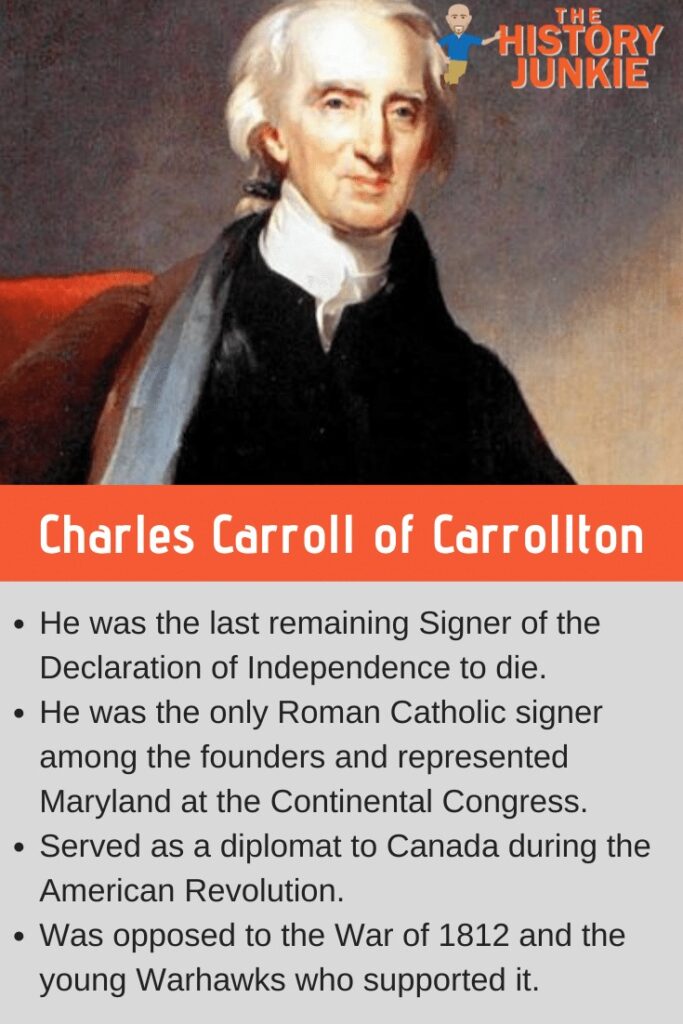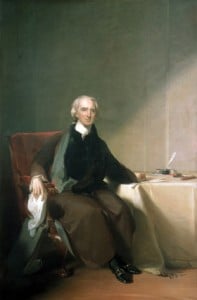Charles Carroll of Carrollton was the last of the signers of the Declaration of Independence to die. Carroll was born illegitimately and was educated in a Jesuit school.

He took his father's religion and practiced as a Roman Catholic which meant that he was barred from entering politics. Carroll went on to become one of the wealthiest men in the 13 original colonies and became a loud voice for American Independence.
He would be elected to the Committee of Correspondence and then to the Second Continental Congress. Here he would serve alongside fellow Maryland delegates: Samuel Chase, Thomas Stone, and William Paca.
The O'Carroll Lineage

Charles Carroll of Carrollton descended from an Irish immigrant named Daniel O'Carroll. Daniel served Lord Baltimore at the founding of the colony of Maryland and established the O'Carrolls as an influential force in the colony.
His son, who is given the title Charles Carroll the Settler, dropped the "O" in the surname "O'Carroll" due to the prejudice against Irish Roman Catholics. He gave birth to another son, Charles Carroll of Annapolis.
Charles Carroll of Annapolis continued to build on his family's wealth. He was an only child, which gave him sole ownership of his father's land.
His son, Charles Carroll of Carrollton, was also an only child and was born out of wedlock. Upon his death, he bequeathed his son his estate. Charles III went on to become one of the wealthiest men in the 13 original colonies and, despite his Catholic faith, participated in politics.
Roman Catholicism in Maryland
Maryland had not always been intolerant to Roman Catholics. At its founding, many of its colonists were Protestant, and they worked alongside Catholics in building up the colony.
It soon became the only place in the English Empire where Catholics held positions of power. This soon changed when Virginia made itself an Anglican colony, which led to many Puritans migrating from Virginia Colony to Maryland. Soon, the Puritans gained control of the politics in Maryland and outlawed both Anglican and Catholic religions.
The Puritan revolt in Maryland resulted in many of the Catholic chapels being burned to the ground. Catholics were persecuted during this time, and would be until the Calvert family once again regained control of the colony and re-established the Toleration Act.
This was short-lived due to William of Orange taking the throne of England during the Glorious Revolution and establishing Protestantism throughout the British Empire. This resulted in those who practiced the Roman Catholic faith practicing it in secret. It also banned them from holding political office.
This then set the stage for Charles Carroll of Carrollton shortly before the American Revolutionary War. He was a devout Catholic, but due to his passion for American liberty was allowed to serve in the Maryland delegation. He would be the only Catholic to serve in the Continental Congress.
American Revolution
Carroll never showed any interest in politics but was most likely compelled to that vocation due to his vast wealth and British taxation. In 1772, he had a notable debate in the Maryland Gazette in which he and Daniel Dulany the Younger debated each other under pseudonyms.
Carroll argued that Maryland had too long been controlled by four families: the Taskers, Ogles, Bladens, and Dulanys. Dulany obviously disagreed with Carroll and argued the opposite view. The two went back in forth in a great debate. This debate caught the eye of many readers and brought the two debaters much attention. Eventually, the identity of Carroll and Dulany was leaked, which resulted in Carroll gaining much fame and notoriety for his arguments.
Dulany, feeling his argument weakening, resorted to personal attacks. Carroll then responded and thus ended the debate and marredDulany's reputation by saying,
virulent, invective, and illiberal abuse, we may fairly presume that arguments are either wanting or that ignorance or incapacity do not how to apply them.
After these debates, Carroll became a leading voice for American independence from Britain. On October 19, 1774, he organized the burning of the Peggy Stewart in response to the tea tax (The Boston Tea Party did not only take place in Boston). He was an early supporter of raising an army to declare independence from Great Britain.
Carroll was elected to Maryland's committee of correspondence in 1774 and would serve as a delegate to the Annapolis Convention until he was selected to serve as a delegate to the Continental Congress.
For a man who had little interest in politics and whose religion barred him from even holding a political office, Charles Carroll of Carrollton was active in politics.
He became the leading voice in Maryland and shared the same sentiment as many of the people did. Unlike some of those he served alongside, he never wavered in his commitment to independence, nor did he need to be swayed to the proposition.
Carroll was selected to join Benjamin Franklin and Samuel Chase on a diplomatic mission to Canada. Their mission was to seek assistance from the French Canadians who were still licking their wounds after the Seven Years' War with Britain.
Carroll was a natural choice due to his Roman Catholic faith and fluent French, but did not help the mission's success. The French refused to help aid the Americans due to the failure of the Invasion of Canada, which was led by Richard Montgomery and Benedict Arnold.
Although Carroll arrived too late to cast a vote in favor of the Declaration of Independence, he did sign it. He signed it Charles Carroll of Carrollton to distinguish himself from his father, Charles Carroll of Annapolis, who was still living. He would become the last surviving signer of the Declaration of Independence.
During the American Revolutionary War, Charles Carroll served on the board of war and went on to serve in the Maryland State Senate. Although he was a leading voice to overthrow British rule, he was also a leading voice to not confiscate the property of Tories. He believed the motives to be wrong and the actions to be unjust.
Even though he carried much influence, the bill easily passed, and Tory property was confiscated. He was then elected to serve as Senator of the United States Senator. Maryland then passed a law that did not allow a man to serve in the State and national legislature at the same time. Carroll then resigned from the U.S. Senate and served in the Maryland State Senate.
Later Years
Charles Carroll of Carrollton was a wealthy planter who owned many slaves. He would become a supporter of gradual abolition and served in the Maryland branch of the American Colonization Society, which was dedicated to the exportation of black Americans to the free African state of Liberia.
Although he was a supporter of abolition, he, like fellow signer Thomas Jefferson, did not emancipate his slaves at his death. This begs the question as to how serious he actually was to the abolition movement.
Carroll retired from public life in 1801 and continued his life as a wealthy planter. He did not surface much after his retirement but did show much distress over the political activity of Thomas Jefferson.
He also opposed the War Hawks, who wanted to go to war with Britain. After the War of 1812, he did not surface again until 1827, when he helped create the Baltimore and Ohio Railroad.
Charles Carroll of Carrollton died on November 14, 1832, in Baltimore. He was the last of the Revolutionary generation to survive.
The movie National Treasure depicts Charles Carroll talking to President Andrew Jackson about the treasure of the templars. Obviously, this was fiction since Carroll was neither a Freemason nor was he in Washington, D. C. when he died.

